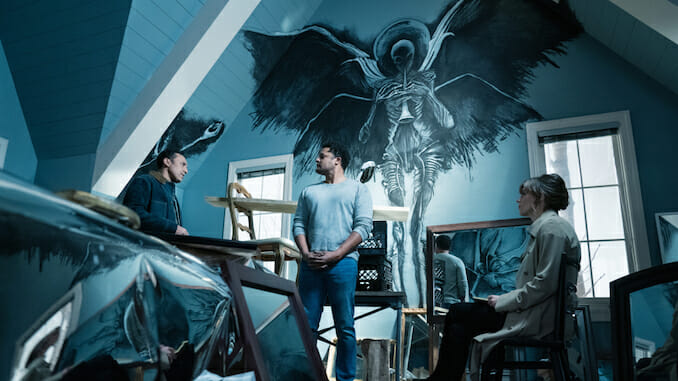Robert and Michelle King on Embracing Horror in Their TV Writing, from BrainDead and The Bite to Evil
Photo Courtesy of Paramount+
Summer 2021 might be “Hot Vax Summer,” but it’s also the “Summer of King.” Yes, novelist Stephen King has a few adaptations landing, but we’re actually referring to Robert and Michelle King, the creators of Evil and The Good Fight, both of which have new seasons dropping on Paramount+ this month.
The married writers/show creators are arguably best known for their Peabody and WGA Award winning series, The Good Wife, the hit legal drama starring Julianna Margulies as Alicia Florrick, a politician’s wife who rises from the humiliating ruins of her husband’s sex scandal. After seven seasons, the pair birthed its spinoff, The Good Fight, which now has five seasons under its belt starring Christine Baranski as liberal lawyer Diana Lockhart, who gleefully works to kneecap the patriarchy, right wing conservatism, and the wicked 1%.
While those two series are categorized as broadcast legal procedurals, when you look at them through the same lens of the Kings’ other recent shows BrainDead, Evil, and the recent Spectrum Original limited series, The Bite, we posit that the creators have really been crafting horror series all along—just wrapping some in the more mainstream accoutrement of leather briefcases, gavels, and business suits.
Because upon closer inspection of their central themes, it’s clear all the Kings’ storytelling reveals their laser-focus on exposing the dark deeds humanity inflicts upon one another, be it personally, corporately, or within “trusted” institutions. The consistent horror subtext has only presented itself more overtly because their recent series have leaned on the far less subtle usage of demons, zombies, and alien infestations to get the same point across.
Curious about how they’ve consciously, and unconsciously, honed their horror storytelling chops from series to series, we recently spoke to the pair via Zoom about the lessons they’ve learned along the way, and what impact they had on their audacious approach to the pandemic thriller, The Bite, and Season 2 of Evil.
This interview has been edited for length and clarity.
Paste: Going back to 2016 and BrainDead, that series was your first jump into political satire with a genre wrapping. What ignited the two of you wanting to be in that space?
Robert King: The problem is, when you’re in a law show for as long as we were, just having some things break is never a mistake. And to have new visual outlooks. I started on Roger Corman, so it wasn’t as much of a stretch. Gulliver’s Travels was an adventure story and it just happened to be one of the best satires of all time. I think you’re always looking for a genre that has enough forward momentum that when you’re doing satire, it doesn’t stop the action. It’s part of the action, so that you’re enjoying it. That sounds more calculated than it is. We enjoy genre and we enjoy genres that are not pretentious, I guess.
Michelle King: Right. Especially when you want to explore issues about religion and belief. That was more the entrance to Evil and deciding, “Okay, let’s do a genre show.” It was that we’ve got this interesting tension between someone who’s a believer and someone who isn’t. Better find an unpretentious way to do it, otherwise, it’s insufferable.
Paste: BrainDead only lasted one season, but was arguably ahead of its time by just a year or two. Were there any specific takeaways?
Robert: We probably too much wanted to create a non-network show on network. You have to be aware, not just of your audience that you’re going for in the world, but your audience in the executive suite. I do think we were just having so much fun that we thought, “Well, this is an audience of two. We love it and our families will probably love it, because they have the same sense of humor.” The other thing is something you can’t control, which is you could have made BrainDead where it was inoffensive. But part of what was cool for us was the offensiveness of attacking the politics of the day, which was basically about how partisan it was getting. I don’t know, did we learn anything else?
-

-

-

-

-

-

-

-

-

-

-

-

-

-

-

-

-

-

-

-

-

-

-

-

-

-

-

-

-

-

-

-

-

-

-

-

-

-

-

-








































